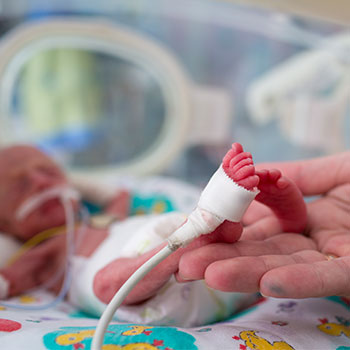
Premature NewBorn
Premature NewBorn
Prematurity is defined as birth of a baby before 38 completed weeks. This could be due to maternal or fetal factors. Once a baby is born preterm, the primary aim of medical team is firstly to save the baby (survival) followed secondly by survival with no developmental delay (intact survival).
The earlier a baby is born, the lesser is the chance of survival. The earliest gestational age (length of pregnancy) at which resuscitation (attempt to save the baby at birth) to be offered in India is recommended by NNF to be 24 weeks completed. In babies born between 22-24 weeks, the resuscitation is to be done only if requested by the family but with extensive counselling that the chances of survival are negligible. Even in surviving babies in this gestational group, the chances of disability are extremely high.
The survival chances of babies progressively increase with increasing gestational age (number of weeks of pregnancy). At 24-26 weeks, the survival chances are 30-40%; 26-27 weeks, it is 50-60%; 28-29 weeks, it is 90-95%; 30-34 weeks, it is 95-98%, >34 weeks, it is atleast 99%.

Care of premature babies
This is a specialized job, needing the treatment in NICU under strict aseptic precautions.
Respiratory System
Breathing is the quintessential requirement of life. Premature babies may have underdeveloped lungs as the purified blood (loaded with oxygen) in the uterine life happens from the placenta. Post delivery, this connection is lost and lungs are needed to do this process. The baby may need oxygen, HFNC, CPAP or ventilator support with / without surfactant, in addition to Caffeine which helps in stimulating lungs to breathe.
Cardiovascular system
The BP may be low, the PDA may be open and blood perfusion may be poor to the various body paths. Each need addressing individually.
GIT & Nutrition
A premature baby may have an immature digestive system The baby may need IV fluid, TPN, tube feeds depending on degree of prematurity and gradual maturation to spoon feeds and direct breast feeds in the NICU. Issues such as NEC / spontaneous perforation are potential life threatening conditions in the GIT.
Infection
The immune system in premature babies is poorly developed and the chance of spontaneous infections is very high. High degree of anticipation, investigation and early treatment are highly needed to save these babies.
CNS
The nervous system is very fragile with chances of spontaneous bleeding and injury secondary to reducred blood and oxygen delivery. The CNS should be assessed regularly by clinical methods and neurosonogram as per protocol to identify abnormality and treat accordingly.
Neonatal Follow up program
The earliest a baby can be discharged from the NICU is at 34+ weeks completed. This could be later in very preterm babies. All premature babies should preferably get hearing check, ROP screen, Thyroid test, Newborn Metabolic Screening prior to discharge. If all the above are not possible prior to discharge, a plan is made to do them at follow up.
Developmental follow up is done upto 2 years of age to identify deficiencies and commence intervention at the earliest, to achieve the best possible outcome.